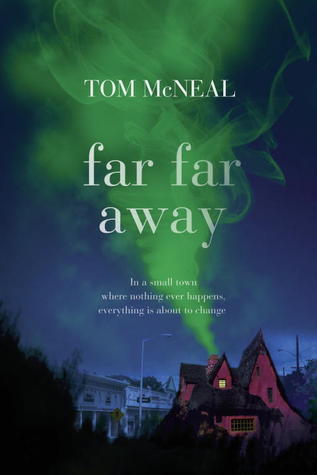Once upon a time, in a town far, far away…
Alright, never mind. Far Far Away is too weird for me to be too weird about it.
Our protagonist, Jeremy, is a normal, good natured boy. He has an absent mother and a troubled but caring father. Money is nonexistent and it’s up to Jeremy to secure enough cash to save his family’s home – a ramshackle bookstore that does zero business. Unfortunately, Jeremy is a bit of a pariah, an oddball the townsfolk don’t really want to rally around. Because he’s poor. And has a weird dad. Oh, and also he hears voices. Well, one voice. The voice of the ghost of Jakob Grimm – you know, like the Brother Grimm. In fact, Jakob Grimm is the focalizer of Jeremy’s story, his narration an ever-present, almost paternal presence, watching as Jeremy bumbles through various adventures and struggles and mysteries.
On the surface, this is a straightforward Kid Makes Friends and Saves the Day narrative, albeit a well-written one. Jeremy is an affable protagonist and his friend Ginger is energetic without being quirky, which I found surprisingly refreshing. But McNeal does some things here with tone, setting, and language that set Far Far Away apart from the YA pack… or from the pack of any sort of established genre, really. The book has an adult narrator – a verbose narrator from a different era, nonetheless. The language is dense. But the narrator isn’t just any elderly narrator, he’s a Grimm brother. Jakob’s narration takes Jeremy’s mundane troubles and weaves them into a fairytale. One moment, Jeremy’s hometown is any small town in the US; the next it’s a village full of archetypal adults – the witchy teacher, the kindly baker, the callous businessman – who either want to help Jeremy or hurt him. The story is realistic, but it’s not realism. Early on, McNeal draws attention to the grisly nature of many fairy tales – the parts of the stories Disney left out – and as the story unfolds, the atmosphere shifts from benign to ominous, from ominous to threatening.
This is a difficult book to categorize and to describe. The closest comparison I can think of is Neil Gaiman’s The Graveyard Book. But if you are a Gaiman fan, a fairytale fan, or are seeking out that YA Not Otherwise Specified, this is one worth checking out.
